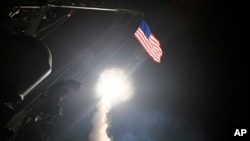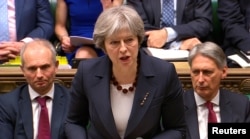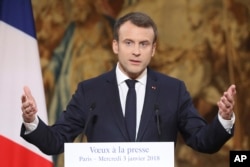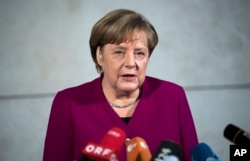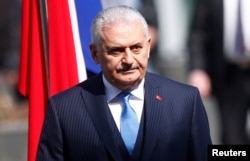The United States says it is working on forming an international coalition to respond to last week's suspected chemical weapons attack in a rebel-held Syrian town that left dozens dead. Here's the latest on which countries may take part in possible military action:
Britain:
Prime Minister Theresa May has indicated Britain is willing to participate in U.S.-led strikes against Syria.
May summoned her Cabinet Thursday for an emergency meeting to discuss the issue. Opposition lawmakers want May to seek parliament's approval before Britain joins any military action. Several reports, however, suggest May has no intention of recalling parliament from its Easter recess, which doesn't end until Monday.
This week, May said "all the indications" suggest Syrian President Bashar al-Assad is responsible for the suspected attack in the town of Douma, east of Damascus.
May has spoken with U.S. President Donald Trump repeatedly in recent days about what she says is the need to "uphold the worldwide prohibition on the use of chemical weapons."
Downing Street officials told VOA that British intelligence chiefs have been urging May not to seek parliamentary approval for retaliatory action against Syria, arguing that her predecessor, David Cameron, made a mistake doing that in 2013 only to be rebuffed by lawmakers, who were worried about a lack of overall strategy toward the war-wracked country.
Opposition leaders have been calling on May to follow convention and recall parliament before launching any military action. Some senior members of Britain's ruling Conservatives also have called for parliament to be recalled.
A former British intelligence chief, John Sawers, told a British broadcaster that Cameron made an error going to parliament in 2013. "Parliament is there to debate and decide on legislation and to hold the government to account. It is not there to take executive decisions. This would be an executive decision of government and rests with the Prime Minister and the cabinet."
France:
French President Emmanuel Macron, who has vowed a "strong" response to Syria, said Thursday he has evidence that the Assad government is responsible for the attack.
"We have proof that chemical weapons were used last week, at least chlorine, and that they were used by the regime of Bashar al-Assad," Macron told France's TF1 television.
Macron did not say what the evidence is; however, he stressed France is in daily contact with the Trump administration and that they will respond "at a time of our choosing, when we judge it to be the most useful and the most effective."
Macron says any action should send a message that governments cannot use chemical weapons with impunity; but, he cautioned against any action that escalates the Syrian conflict or harms regional stability.
Germany:
German Chancellor Angela Merkel on Thursday said her country would not participate in any possible military action against Syria.
"But we acknowledge and support that everything has to be done to signal that this use of chemical weapons is unacceptable," Merkel said. That includes, she said, German support for an international fact-finding mission from the Organization for the Prohibition of Chemical Weapons, which will soon deploy to Douma.
Merkel also concludes there is "strong evidence" Assad carried out the attack.
Turkey:
Turkey has given conflicting messages about a U.S.-led response in Syria.
Initially, a presidential spokesperson said the "Syrian regime will have to pay a price" for the Douma incident; but, Turkish Prime Minister Binali Yildirim has said the U.S. and Russia should end their "street fighting" over Syria.
Turkey, a NATO member, has backed rebels in Syria who are trying to oust Assad. But Turkey also has troops in the northern Syrian region of Afrin, as part of a campaign against Syrian Kurdish militants it views as terrorists. That campaign has created tensions with the U.S., which has relied on Kurdish fighters to help deprive Islamic State of most of its territory.
VOA's Jamie Dettmer contributed to this story.
